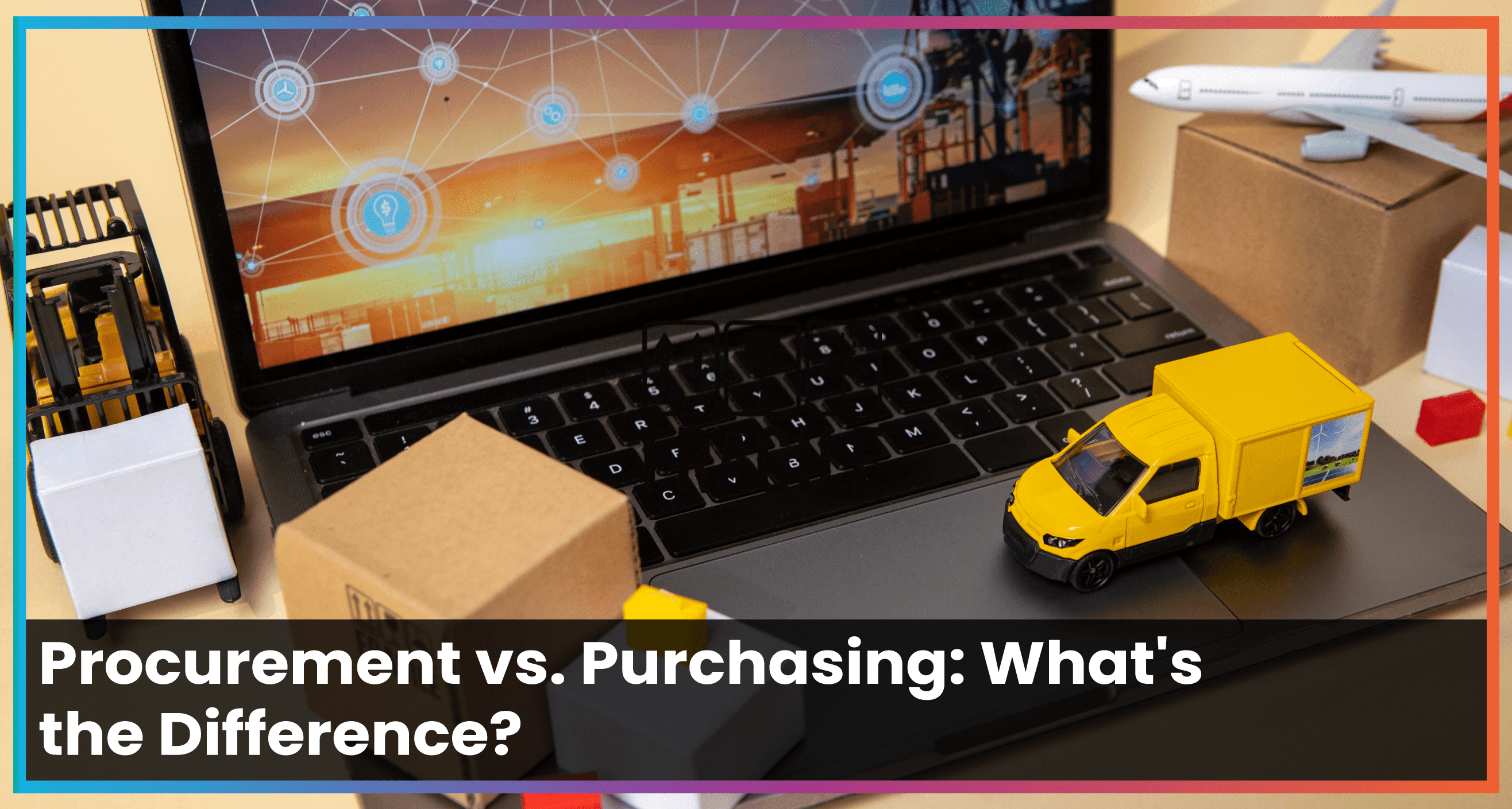Procurement vs. Purchasing: What's the Difference?
Posted On: Aug 04, 2023
In the world of corporate vendor management, two words are often used interchangeably, Procurement and Purchasing. While both stand to play a part in obtaining goods and services, it is important to understand that they are different, and each has its unique meaning. In this blog post, let us delve into understanding the nuances between Procurement and Purchasing, focusing on their distinct features and the benefits they contribute to vendor management processes. For organizations aiming to enhance their operations, it’s important to get a clear understanding of these words.
Procurement:
Procurement, in simple words, means the strategic management of vendors to acquire goods and services that meet a company’s requirements. This encompasses a series of activities aimed at identifying, sourcing and managing vendors to fulfil a company’s needs. It is much more than just the transactional nature of purchasing, focusing more on a systematic, strategic and holistic approach. Professionals in corporate vendor management would be emphasizing on mitigating risks, optimizing costs and getting the best value for their organizations.
Strategic sourcing becomes the foundation of procurement. For building an effective procurement system, organizations need to adopt a purchasing management system that can strategically handle the sourcing process, which involves an in-depth analysis of the company’s requirements, market dynamics, and vendor capabilities. Companies need to thoroughly analyze vendors before bringing them on board based on factors such as quality, reliability, price, ethical practices, reputation etc. Companies need to find vendors that can align with the organizations’ goals and values.
A vendor management system is another important aspect of procurement. Building and nurturing strong relationships with vendors determine the success of companies in the long run. Companies should aim to build relationships with vendors that can foster open communication, trust and collaboration. This is made possible with the help of good vendor management software that creates a transparent, open medium between the companies and vendors, which encourages joint innovation, quality improvement, and timely delivery, resulting in mutual benefits and long-term success.
Contract management is another important aspect of procurement. Effective contract management ensures that both companies and vendors adhere to the terms and conditions agreed upon in the contract. Professionals who draft, negotiate and manage contracts with suppliers, make sure to define parameters such as pricing, delivery schedules and quality requirements. A robust contract management process ensures accountability and reduces risks associated with vendor relationships.
Risk mitigation becomes the central focus in procurement to save companies from potential disruptions. Organizations should proactively identify and manage risks associated with vendors, which will help in preventing any sort of delays, quality issues and financial instability. Through thorough vendor assessments, due diligence and contingency plans, companies can reduce the chances of potential risks effectively and safeguard their operations. An effective purchasing management system will have a robust risk mitigation process set up so that they can make informed decisions in case any risk crops up.
Purchasing:
Purchasing simply means the operational implementation of procurement strategies. It includes activities related to transactions, such as acquiring goods and services from vendors. While procurement is strategic, purchasing emphasizes efficiently fulfilling the specific requirements considering all the parameters. So purchasing is the execution of procurement strategies, facilitated by purchasing management system.

The first step in purchasing is requisition processing, where company requirements are identified, and purchase requisitions are prepared. For efficient corporate vendor management, a good purchasing management system would simplify the requisition process to a large extent. By leveraging the features of purchasing management system, companies can capture all necessary details, such as specifications, quantity, quality and delivery requirements in a structured manner.
Vendor selection is one of the most critical aspects of purchasing. Vendors need to be shortlisted based on predefined criteria, such as price competitiveness, quality, and reliability, ensuring that the vendors would be capable of meeting the specific requirements. Companies can then utilize the power of procurement automation tools to simplify order placement and management. Companies can leverage the potential of vendor management software to generate and track purchase orders and ensure accurate documentation and effective communication with vendors. With the help of a good purchasing management system, organizations can maintain a centralized repository of purchase orders, and additionally streamline the monitoring and management of vendor relationships efficiently.
Once the purchase order is placed, with the help of a good purchasing management system, professionals can efficiently monitor the order fulfilment and delivery process. This involves continuously tracking the orders, coordinating with the vendors and ensuring the goods and services are delivered on time. Effective communication between vendors and the organization plays an important role in ensuring the orders are fulfilled successfully.
Furthermore, purchasing involves the verification and processing of vendor invoices. Using procurement automation tools, such as PartnerPortal.ai organizations can efficiently verify vendor invoices, verify them with purchase orders, receive necessary documents and initiate payments. Having robust vendor management software in place will facilitate companies to streamline their invoice reconciliation and payment processes, promoting strong financial relationships with their vendors.
Mastering the art of procurement and having a good purchasing management system in place is a key driver for any company’s business success. Understanding the difference between Procurement and Purchasing enables companies to develop solutions that cater to specific requirements. Additionally, recognizing the disparities between Procurement and Purchasing enables companies to implement a holistic approach to vendor management, promoting strategic partnerships with vendors while efficiently managing the day-to-day procurement operations.
PartnerPortal.ai, a cloud-based, AI-powered vendor management software, can revolutionize the procurement journey for your company. With its advanced features and capabilities, PartnerPortal.ai serves as a game-changer offering unparallel benefits such as fostering active communication, unified vendor management, efficient procurement and accurate billing and payments. PartnerPortal.ai can truly be your company’s superhero to achieve unmatched visibility and real-time insights. Embracing a comprehensive solution like PartnerPortal.ai can transform the procurement landscape for your business, empowering your company to achieve operational excellence and a competitive edge in the rapidly evolving and super competitive business world.